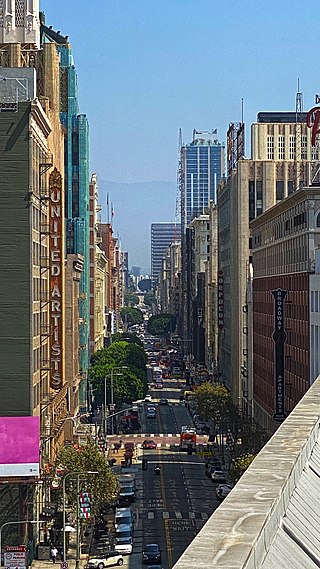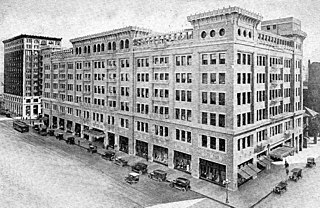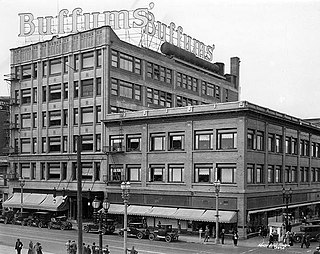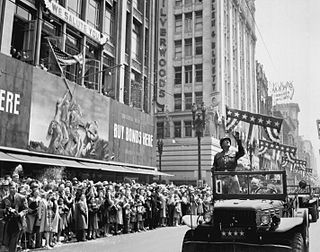
Hollywood Boulevard is a major east–west street in Los Angeles, California. It runs through the Hollywood, East Hollywood, Little Armenia, Thai Town, and Los Feliz districts. Its western terminus is at Sunset Plaza Drive in the Hollywood Hills and its eastern terminus is at Sunset Boulevard in Los Feliz. Hollywood Boulevard is famous for running through the tourist areas in central Hollywood, including attractions such as the Hollywood Walk of Fame and the Ovation Hollywood shopping and entertainment complex.

The Harris Company was a retail corporation, based in San Bernardino, California, that operated a chain of department stores named Harris', all in Southern California. Philip, Arthur, and Herman Harris – nephews of founder Leopold Harris of what was once the large Los Angeles–based chain Harris & Frank – started the company with a small dry goods store in 1905, and the company eventually grew to nine large department stores, with stores in San Bernardino, Riverside, and Kern Counties.

Broadway, until 1890 Fort Street, is a thoroughfare in Los Angeles County, California, United States. The portion of Broadway from 3rd to 9th streets, in the Historic Core of Downtown Los Angeles, was the city's main commercial street from the 1910s until World War II, and is the location of the Broadway Theater and Commercial District, the first and largest historic theater district listed on the National Register of Historic Places (NRHP). With twelve movie palaces located along a six-block stretch of Broadway, it is the only large concentration of movie palaces left in the United States.

J. W. Robinson Co., Robinson's, was a chain of department stores operating in the Southern California and Arizona area, previously with headquarters in Los Angeles, California.
I. Magnin & Company was a San Francisco, California-based high fashion and specialty goods luxury department store. Over the course of its existence, it expanded across the West into Southern California and the adjoining states of Arizona, Oregon, and Washington. In the 1970s, under Federated Department Stores ownership, the chain entered the Chicago, Illinois, and Washington, DC, metropolitan areas. Mary Ann Magnin founded the company in 1876 and named the chain after her husband Isaac.
The Broadway was a mid-level department store chain headquartered in Los Angeles, California. Founded in 1896 by English-born Arthur Letts Sr., and named after what was once the city's main shopping street, the Broadway became a dominant retailer in Southern California and the Southwest. Its fortunes eventually declined, and Federated Department Stores bought the chain in 1995. In 1996, Broadway stores were either closed or converted into Macy's and Bloomingdales.

May Company California was an American chain of department stores operating in Southern California and Nevada, with headquarters in North Hollywood, California. It was a subsidiary of May Department Stores and merged with May's other Southern California subsidiary, J. W. Robinson's, in 1993 to form Robinsons-May.

Buffums, originally written as Buffums' with an apostrophe, was a chain of upscale department stores, headquartered in Long Beach, California. The Buffums chain began in 1904, when two brothers from Illinois, Charles A. and Edwin E. Buffum, together with other partners, bought the Schilling Bros., the largest dry goods store in Long Beach, and renamed it The Mercantile Co. The store grew to a large downtown department store, and starting in the 1950s, grew slowly over the years to be a small regional chain of 16 speciality department stores across Southern California at the time of its closure in 1990.

The Broadway Hollywood Building is a building in Los Angeles' Hollywood district. The building is situated in the Hollywood Walk of Fame monument area on the southwest corner of the intersection referred to as Hollywood and Vine, marking the intersection of Hollywood Boulevard and Vine Street. It was originally built as the B. H. Dyas Building in 1927. The Broadway Hollywood Building is referred to by both its main address of 6300 Hollywood Boulevard and its side address of 1645 Vine Street.
Akron Stores or The Akron was a Southern California–based imported goods and home decorating department store retail chain established in 1947 and was known to carry unusual merchandise, mostly imports. The chain had over 24 stores throughout Southern California from San Diego to San Francisco before it was forced to close in 1985.

Harris & Frank was a clothing retailer and major chain in the history of retail in Southern California, which at its peak had around 40 stores across Southern California and in neighboring states and regions. Its history dates back to a clothing store founded by Leopold Harris in Los Angeles in 1856 near the city's central plaza, only eight years after the city had passed from Mexican to American control. Herman W. Frank joined Harris in partnership 32 years later in 1888.

Mullen & Bluett was a Los Angeles-based department store specializing in men's clothing.

Myer Siegel was a Los Angeles–based department store, founded by Myer Siegel (1866–1934), specializing in women's clothing.

The Famous Department Store was a department store in Los Angeles, California.

B. H. Dyas Co. was a Los Angeles sporting goods retailer that turned into a department store and went out of business in the 1930s, owned by Bernal Hubert Dyas (1882–1959).

Barker Bros. was a retailer of furniture, home furnishings, and housewares based in Los Angeles, California, United States. Founded as Barker and Mueller in 1880, the business operated under various names through 1992.

7th Street is a street in Los Angeles, California running from S. Norton Ave in Mid-Wilshire through Downtown Los Angeles. It goes all the way to the eastern city limits at Indiana Ave., and the border between Boyle Heights, Los Angeles and East Los Angeles.

Willets or Willet's was a longstanding department store in Colton, California.

Retail in Southern California dates back to its first dry goods store that Jonathan Temple opened in 1827 on Calle Principal, when Los Angeles was still a Mexican village. After the American conquest, as the pueblo grew into a small town surpassing 4,000 population in 1860, dry goods stores continued to open, including the forerunners of what would be local chains. Larger retailers moved progressively further south to the 1880s-1890s Central Business District, which was later razed to become the Civic Center. Starting in the mid-1890s, major stores moved ever southward, first onto Broadway around 3rd, then starting in 1905 to Broadway between 4th and 9th, then starting in 1915 westward onto West Seventh Street up to Figueroa. For half a century Broadway and Seventh streets together formed one of America's largest and busiest downtown shopping districts.
















